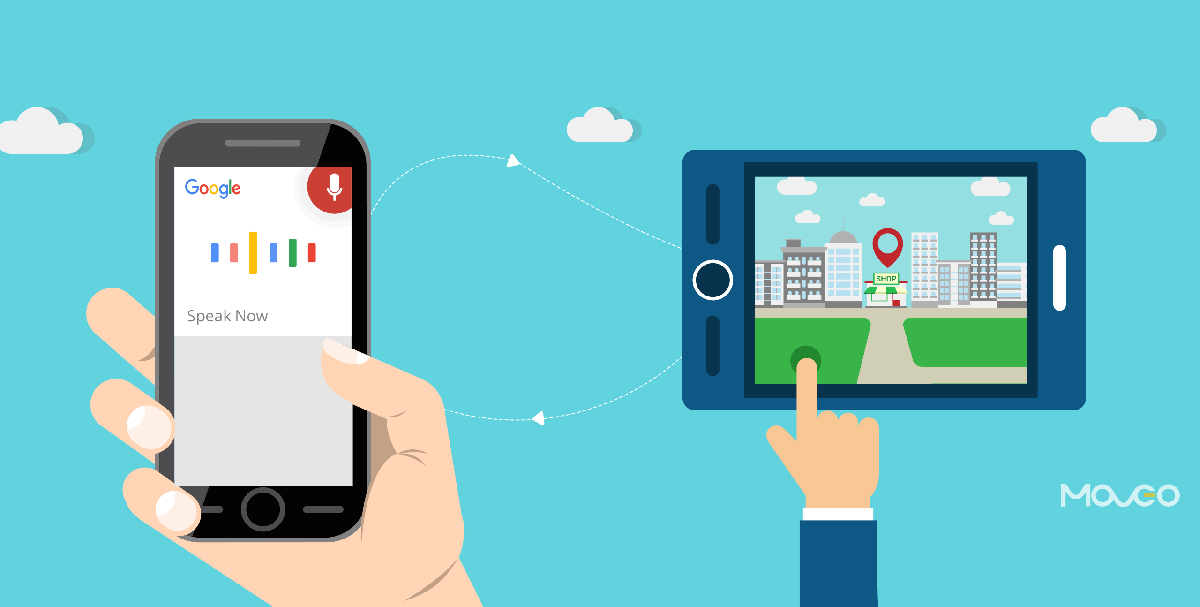If you’ve been wondering what the buzz about Voice Search and Augmented Reality is, this blog post will clear the air. With unprecedented advances in technology and the way smartphones, wearables and other gadgets are transforming our lives, there is no limit to what they can do.
Let us take a look at two technologies that are rapidly transforming the way we interact with our gadgets and the world around us.
Voice Search
The rate at which technology has evolved is unfathomable. Earlier, we were awed enough that we could talk to a friend continents apart using a phone. But now, we can actually talk to the phone and make it follow our commands. So you can ask Siri to send a message to your mom, ask Cortana to order a pizza, or get Alexa to dim the lights and play you a song.
“40% of adults now use voice search once per day,” according to CampaignLive.
Homo sapiens learned to communicate first through speech and then came text. In the case of technology, however, things happened the other way round. We have been operating our computers and phones by using text for a long time, and only now has voice recognition become a dependable reality. With the advent of systems like Siri, Cortana, Alexa, and Amazon Echo, voice search and voice commands have made their way into our daily lives. It’s no wonder then that Amazon sold 4.4 million Echo units in its first full year of sales, according to GeekWire.
Mobile app developers and app marketers can use voice search to their advantage by just making a few changes in their marketing strategy. All this time, keywords have been at the very center of app marketing and SEO. However, when a user performs a voice search, he or she is more likely to ask, “Where is the nearest gas station?” and not “gas stations Dallas Texas.” Most long-tail voice searches are likely, to begin with, ‘what,’ ‘where,’ ‘when,’ ‘why’ and ‘how.’ Marketers need to align their search results based on these questions for their content or app to show up in voice search results.
Google has become incredibly intelligent and intuitive over the years and search results are insanely precise and accurate today. Clickbait content and low-quality keyword-stuffed content has absolutely no place in the SERPs. Short and quick queries like unit conversions, international time, movie actors’ names, and other precise questions get answered right at the auto-complete stage in the address bar. In an age of such precision, voice search is set to make results even more conversational. It comes as no surprise from Forbes that 2017 will be the year of voice search.
So with consumers increasingly turning to intelligent assistants like Siri, Cortana and Alexa, mobile app developers too must integrate voice search in their apps to provide quicker, sharper and more conversational results. In fact, Google OK is set to revolutionize in-app search with voice. It is imperative that all mobile app development taking place now must be voice-search-compatible. So if your app is a restaurant finder, the user should be able to bring the phone or watch to their mouth and say, “Where’s the nearest restaurant?” and your app should be able to display in-app results immediately.
Augmented Reality
If you’ve wandered off too far chasing a Pokémon and now feel a little bit lost, you can hold up your phone and point the camera around. If you have the right Augmented Reality app like Wikitude installed, you’ll know just where you are and also about the places of interest in your location. For example, you will be able to see where the nearest Starbucks is or scout for the nearest subway line and head home.
Augmented Reality (AR) is a real game changer in the world of mobile apps. AR technology allows a user to superimpose a product, feature or convenience on his real surroundings to see what things will look like if they had that product, feature or convenience for real. AR gives app developers an opportunity to provide users with a lifelike experience of how their product can change their lives. It is as close as it gets to real-life test driving and serves as a far more powerful way to engage a customer.
Let’s take a look at how some of the largest industries stand to benefit from Augmented Reality applications –
Retail and e-commerce
By providing virtual trial rooms, where users can try on different clothes and accessories in different sizes and colors, and quickly choose what suits them best, AR can consequently reduce returns to a large extent. The same technology can be used for trying furniture in your home before buying it or trying different car colors or even jewelry or makeup.
Education and Training
The applications of AR in education and training are truly limitless. AR, in combination with VR (Virtual Reality), can help students gain real-life perspectives and simulated experiences that facilitate a much clearer understanding of the concept. Astronauts and combat pilots have already been using this technology, but it has now become more advanced and accessible to students in other streams too. Surgical interns can practice procedures without actually making an incision. Sportsmen can hone their skills even when the weather outside is bad. The possibilities are endless.
According to Goldman Sachs, the educational market for VR/AR is projected to reach $300 million by 2020.
Manufacturing
AR-aided digital maps, product designs, and prototypes can save a great deal of time and deliver precise data and insights in the manufacturing process. Project managers can see how the projected product will appear and function, and recommend structural modifications early in the process. They can also better monitor work progress with the help of AR markers on equipment.
Travel and Tourism
One of the most dynamic uses of augmented reality is in the travel industry. GPS maps fortified with AR can give a clearer, more interactive view of one’s surroundings, provide more detailed and accurate city guides that are a breeze to navigate, and make finding nearby utilities extremely effective. All a user has to do is point the camera to see detailed descriptions of what’s around.
In short, mobile app developers must make proactive efforts to leverage the power of augmented reality in app development. Businesses should offer their customers a more engaging, interactive and life-like experience with AR capabilities in their mobile apps.
Conclusion
It is evident that Voice Search and Augmented Reality aren’t just fancy features you can choose to sprinkle around if you feel like, anymore. The aware and smart consumers of today demand a cutting-edge experience, and to gain any stickiness with them, voice search and augmented reality must become intrinsic parts of your mobile apps.


